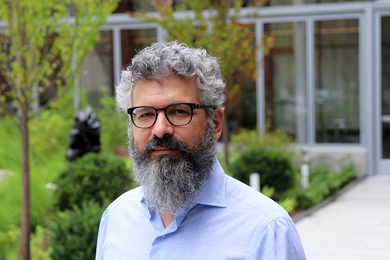The Language Instinct by Dr. Steven Pinker, professor of psychology and director of the McDonnell-Pew Center for Cognitive Neuroscience, has won the Linguistic Society of America's inaugural Linguistics, Language and the Public Interest award. The award recognizes work which fosters greater public understanding of and appreciation for linguistics and language.
Professor Pinker's book uses knowledge of grammar and language to expound the theory that language is a human instinct wired into the brain by evolution, and it emphasizes the role of linguistics in understanding the mind. The Language Instinct was also named one of the 10 best books of 1994 by the New York Times Book Review, The Boston Globe, The Times (London) and other newspapers, and it has been the subject of several national television and PBS radio programs.
----------
Institute Professor Emeritus Ascher M. Shapiro has received honorary membership in the American Society of Mechanical Engineers. Professor Shapiro received ASME's highest honor for "his outstanding and dedicated leadership in the field of fluid mechanics, his preeminence in international engineering education, and for being a founder in the field of biomedical engineering."
Professor Shapiro received the SB and ScD from MIT in 1938 and 1946, respectively. He worked as a laboratory assistant starting in 1938 and subsequently held a number of professorships, culminating with his appointment as Institute Professor in 1975. he also served as chair of the faculty and head of the mechanical engineering department. Professor Shapiro retired in 1986.
----------
Loren Graham, professor of the history of science in the Program in Science, Technology, and Society, was awarded the George Sarton Medal at the annual meeting of the History of Science Society in November. The Sarton medal is the Society's highest award, presented in recognition of "a lifetime of professional achievement." Several of Professor Graham's books and articles have won national awards. His latest book is A Face in the Rock, a work on Native American history.
----------
Professor Alexander Rich, the William Thompson Sedgwick Professor of Biophysics in the Department of Biology, has received an honorary doctorate from the Free University of Berlin, Germany. In covering the ceremony, the Berliner Morgenpost newspaper noted that he "has maintained especially close contact with the Free University by way of numerous aspiring young scientists from that university who have been affiliated with his laboratory. A few of these scientists have in the meantime assumed professorships at German universities."
Professor Rich is recognized as a preeminent researcher in structural molecular biology. He has been a James R. Killian Faculty Achievement Lecturer and received the Medal of Science in a White House ceremony in October 1995.
----------
Hannah Landecker, a graduate student in the History and Social Study of Science and Technology doctoral program, has been awarded the 1996 Siegel prize for her paper entitled "Selling Cellvation: HeLa Cells and Immortality." The prize, administered by the Program in Science, Technology, and Society, was established by friends and family of Benjamin M. Siegel (SB '38, PhD '40 in physical chemistry). Dr. Siegel, a pioneer and international leader in the development of modern electron microscopy, was also interested in the history and philosophy of science, technology and education.
----------
Professor William F. Pounds of the Sloan School of Management has been given the Distinguished Merit Award by his alma mater, Carnegie Mellon University, "for outstanding merit, service and achievement." Professor Pounds earned the BS in chemical engineering (1950), and the MS (1959) and PhD (1964) in industrial administration from Carnegie Mellon, and joined the MIT faculty in 1961. He became a full professor and dean of the Sloan School five years later. He stepped down as dean in 1981 to become president and CEO of Rockefeller Financial Services, then retired from the firm in 1991 and returned to MIT as a full-time professor.
A version of this article appeared in MIT Tech Talk on February 5, 1997.





